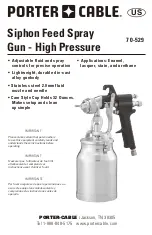
The Following Hazards Can Occur During The Normal Use Of This Product:
HAZARD
Risk
of
explosion
or
fire
-
flammable
materials
HAZARD
Risk
of
explosion
-
incompatible
materials
HAZARD
Risk
of
breathing
Always wear hearing protection when operating
spray equipment.
Never place hands in front of nozzle.
Direct spray away from self and others.
HAZARD
Risk
of
flying
objects
HAZARD
T
I
T
N
E
V
E
R
P
O
T
W
O
H
N
E
P
P
A
H
D
L
U
O
C
T
A
WH
Risk
of
injection
WHAT COULD HAPPEN
HOW TO PREVENT IT
When paints or materials are sprayed, they are
broken into very small particles and mixed with air.
This will cause certain paints and materials to become
extremely flammable and could result in
serious injury or death.
Never spray near open flames or pilot lights in
stoves or heaters.
Never smoke while spraying.
Provide ample ventilation when spraying indoors.
WHAT COULD HAPPEN
HOW TO PREVENT IT
The solvents 1,1,1-Trichloroethane and Methylene
Chloride can chemically react with the aluminum
used in most spray equipment, and this gun and
cup, to produce an explosion hazard and could
result in serious injury or death.
Read the label or data sheet for the material you
intend to spray.
1. Never use any type of spray coating material
containing these solvents.
2. Never use these solvents for equipment cleaning
or flushing.
3. If in doubt as to whether a material is compatible,
contact your material supplier.
WHAT COULD HAPPEN
HOW TO PREVENT IT
Use a
NIOSH approved mask or respirator and pro-
tective clothing designed for use with your specific
application and spray materials. Some masks
provide only limited protection against toxic materials
and harmful paint solvent. Consult with a Safety
Expert or Industrial Hygienist if uncertain about your
equipment or materials.
Some paints, coatings and solvents may cause lung
damage, and burns if inhaled or allowed to come
into contact with skin or eyes.
WHAT COULD HAPPEN
HOW TO PREVENT IT
Certain parts are under pressure whenever the gun
is connected to a pressurized air line. These parts
may be propelled if the gun is disassembled.
Compressed air may propel dirt, metal shavings,
etc. and possibly cause an injury.
Prolonged exposure to air spray can result in per-
manent damage to hearing.
Disconnect the gun from the air line, or completely
depressurize the air line whenever the gun is to be
disassembled.
Never point any nozzle or sprayer toward a person
or part of the body.
Always wear ANSI 278.1 safety approved goggles
or glasses when spraying.
Spray guns operate at pressures and velocities
high enough to penetrate human and animal flesh,
which could result in amputation or other serious
injury.
! See a physician immediately !




































